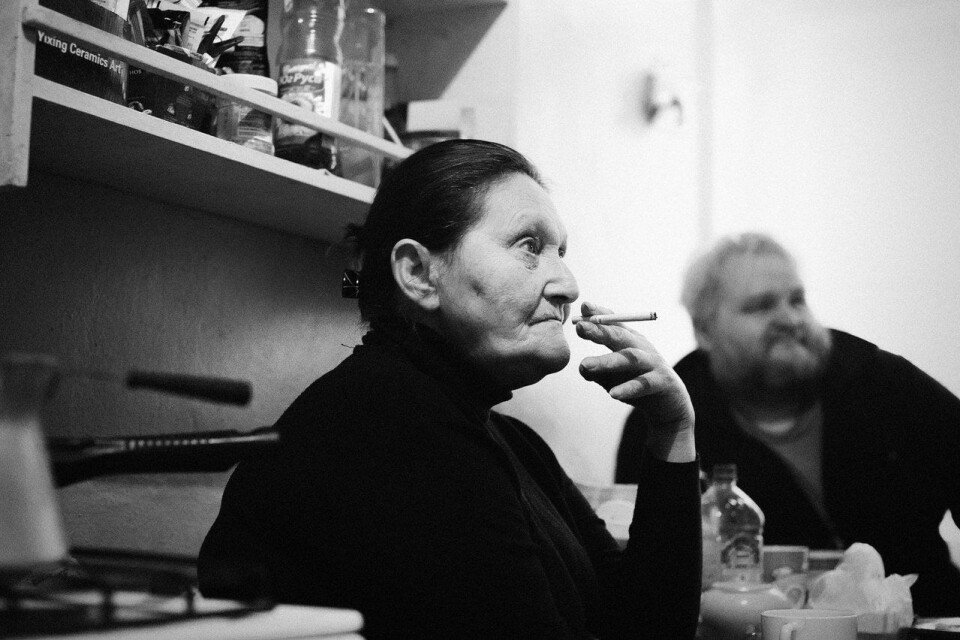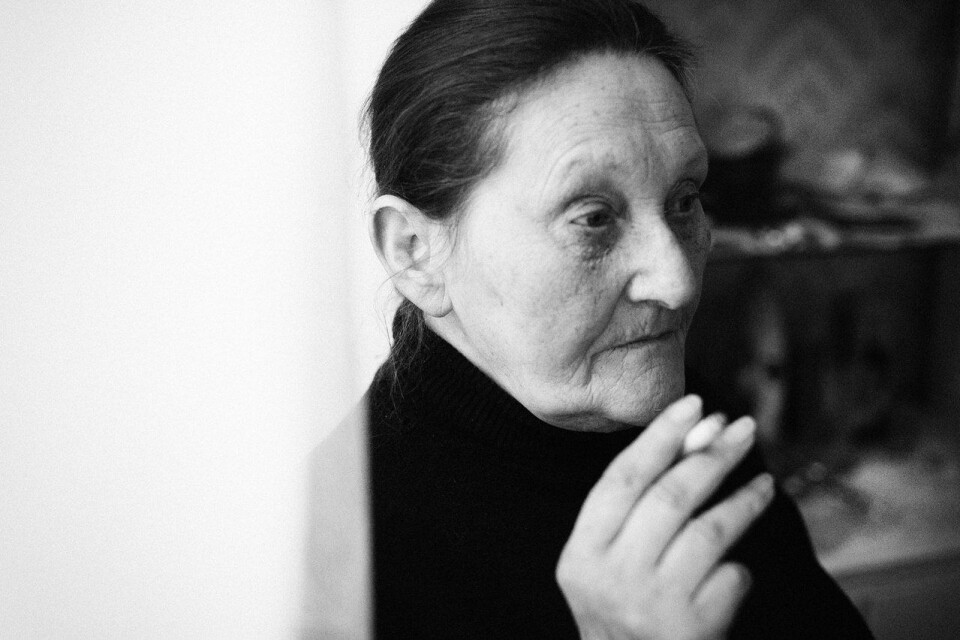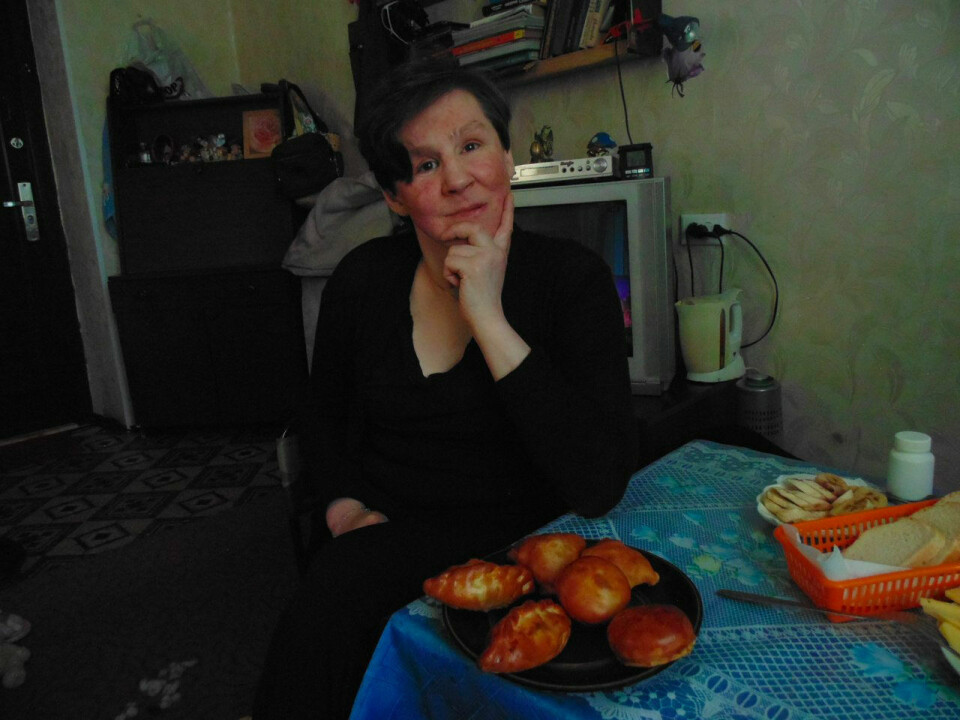
«Women agree to have sex in exchange for cigarettes». Life of lesbians in Russian prisons
Four former inmates tell stories about abuse and suppression in Russia's penal system. But there is also love.
Text by Natalia Donskova, photos by Olga Holodnaya and Aleksey Sergeev
The regulation on homosexuality was excluded from the Russian Criminal Code 25 years ago, on the 29th April 1993, in connection with Russia’s joining of the Council of Europe. However, it still remain firmly ingrained in Russian executive laws. The Russian Criminal Executive Code includes numerous official and unofficial ways to punish prisoners for their sexual relationships. Most often, in order not to spoil official statistics, prison authorities apply punitive after-hours labor or the female inmates are sent to special confinement under different pretexts.
They are told that they are not punished for sex itself, but for «being in someone else’s bed.» The Russian prison system has many ways to suppress the personality of the prisoner. Relationships in prisons also become the basis for persecution and blackmail. While in male jails one of the most serious punishments is to become a so-called “petukh” (cockerel), which means that you are called a homosexual and are not allowed to sit at the table with others and speak with others, then in female jails everything is much more complicated. However, also there homosexuality is one of the factors that can significantly worsen the quality of life. The prison administration finds a way to make your personal attachment an instrument for achieving its goals.
In this report, we meet with four former prisoners who tell us about their experiences — what it’s like to love in prison.
Natalia
Natalia got her freedom in September 2010, she has a total prison experience of more than 15 years. She has herself lost the count of the number of years in detention.
She got the first terms for pickpocketing, then she was given twenty years for drugs. And when she was released, she burst with energy, a power that she previously used to track down money and drugs. The energy persisted, and she felt a need to spend it on something good. Now, Natalia is a LGBT activist who has become famous for her YouTube video made following the controversial video made by cadets at the Russian Aviation College. Natalia’s video scored more than half a million views.

— Did your first homosexual experience happen in prison?
— I believe that I was lucky, because I had sexual relations with a woman before the first term. And I understood everything about myself. In fact, perhaps, nothing might have happened under those bestial conditions. Not that it would not have continued, but I would not have had the experience. Because everything is visible, including sex. In the colony, beds are placed very close to eachother, in two tiers. There are about 150 people in one section. But it’s not bad, it’s good, in fact, when a lot of people have some sort of autonomy. When twenty people are in the same room, you are always in full view.
— You are not punished for sex itself, but for the fact that you “are on someone else’s bed”, are you?
— Formally, sexual relations are considered a violation, but this thing is difficult to prove, in other words, everyone knows everything, and the commanders of the detachment take part in these relations, protect lovers or punish them. But they can prove it if they catch you at night. And there are no other variants. Officially they are punished, and unofficially — they are encouraged. Because the prison administration believes that it is a powerful tool of influence.
I had different relationships. Many of my girlfriends loved to make plans for the future: «we will come out and live together.» But I was not interested. I did not understand how to live with one person for a long time. Later, when I was 30 (I was free already), I went to Volkhov. There I met a woman, she worked at the factory, and we ended up together for 23 years. And you know, the least of all problems in my life was the fact that I was a lesbian.
— What do you think, is there a big difference in the LGBT community in the closed institutions compared with the free society?
— The subculture in the Russian prisons and lesbian culture on the outside is very different. In the prisons, there is a culture of adaptation. Females’ masculinity is highly prized, a kind of women-like husbands. The woman herself may be heterosexual, but others quickly secure a grip on her. And then she starts walking as if she had a kilogram pair of testicles in her pants. I do not understand this, this is not a woman, but a man.
Surviving is easier when there is a girlfriend.
The origins of adaptive relations are simple — usually women who have served a long term, have no parents. There is no one to send them parcels. Surviving is easier when there is a girlfriend. Moreover, in many Russian institutions there are problems with personal supplies like pads and toothpaste. For example, according to a report by Lyudmila Alpern from 2016, in local police custody facilities, pads are given out in only five regions, and in detention centers — in 10 of 19 regions. The situation is aggravated by the fact that female inmates simply do not know that they themselves must provide hygiene products. Therefore, they do not request it. And if prisoners don’t ask, they will not get it.

— Did a female officer ever fell in love with a female prisoner?
— Once the female chief of the educational department fell in love with a prisoner, a vicious girl, who subsequently was appointed head of the prison cultural club. It was a catastrophe, because one can receive incentives for taking part in performances in order to get out earlier. So, all prisoners depended on this woman. This is bad for inmates and bad for the administration. And the officer did everything her girlfriend requested. Prisoners had to put up with her.
And another story was simply “mama-mia”. An officer in the operational department fell in love with an inmate, a masculine woman, her name was Anka. The officer brought her heroin, and everyone knew it. We looked at all this like camels from the “Camel” advertisement. We started to think that the whole administration was on drugs.
Such stories are quite common. Prisoners often agree to accept favorable offers in order to ease conditions of detention and secure early release.
Katya and Olga
Leningrad Oblast. 38-year old Olga has recently been released from jail in Mordovia. Then she found shelter at her ex-girlfriend Katherine. Now, the couple lives in a three-room apartment: Katya and Vita, and Olga. Olga has no citizenship, no documents, no housing, no work. This story began almost 15 years ago. Katya and Olga met in Petersburg, lived together for six years, then parted. All the time she was on a police wanted-list. She quarreled with Katya. She took her things and went out in a park, and then appeared again in the life of Katya only two years later. One day Katya received a message through social media: “Hi, I’m in Mordovia.” Also Katya has a prison experience, she was in a colony in Sablino, Leningrad region, in the early 2000s.
— Do women who have female partner in prisons associate themselves with the LGBT community?
Olga: There were some inmates who had female partners on the outside, I and a couple of people. All the rest lived with men, they have children. I realized my orientation already in childhood, and know exactly what I want.
Katya: We did not have such a term as a lesbian. Nobody considered themselves lesbians. Well, in the prison there were no woman which I really desired, but I still needed sex. So there was no other way, it was for the sake of my health. I learnt about LGBT recently. Although I have been dating girls since I was 14 years old, and now I’m 38.
— Do relationships continue after prison?
Katya: I was released earlier than my girlfriend. When she got her freedom, she came to me, but my father did not let her in. I was looking for her, then I received a letter saying that her house had been burnt. I did not know where she is now.
People have feelings, and it is very difficult, because in there everything is always in sight
Olga: I stayed with my first girl in a quarantine for a long time. At first, she mocked me. Then she started to help me with my work. When I got into a big fight and was hit with a screwdriver, she came and nursed my head, and then the relationship started. She was five years younger than me. Jealousy was very much involved: «Why on earth do you chat and drink tea with her?» And then: «Darling, damn it, let’s stay friends.» People have feelings, and it is very difficult, because in there everything is always in sight. Outside, you can leave, but here you can not. And my first relationship ended when she got her freedom.
— Is there a caste system in the penitentiaries where you served your sentence?
Olga: Evil terms about lesbians such as «kobel» (active lesbian), «kovyrialka» (passive lesbian) were uncommon among us. If they called someone a «kobel», then it was purely a joke. We had partners. Inmates from the lower caste did not have partners. A “chepusila” («A nobody») is somebody that does not look after herself, and does lousy work. Usually they have manual work. As a rule, if they do not want to wash, they get some hot water. They communicate only with other “nobodies”, and no one will have tea with them. Such people can be easily beaten, and the officers have clubs for beating in case they do not fulfill the plan for sewing. There was a lot of pressure. They beat to blood. Strong. Hard.
Katya: And about the «kobles»: We met with guys from the male jail. All our «kobles» spoke of themselves as men, they dressed up weirdly, made makeup. I said: «Ah, my boys with pussies.» They are like males: «I’m not Yulia, I’m Yura.» When they were congratulated with March 8th, they made a scandal, but when males came…
The main difference between the male and female jails is the caste system in men’s prisons. And if «a nobody» can be cleaned and become a «normal person», there is no return from the “offended” caste in male prisons. Women can change roles, in men’s jails it is not possible. If someone is a passive homosexual, then he always remains such, and he can not be pleased or pitied. Why do they rape? They want to humiliate someone, to bring to the caste of the lowered, to whom no one gives a hand. This is done so that you can demand money in exchange for some kind of human relationship. For example, this happened in the well-known Pshenichny Case, where sexual violence was used as a mean of pressure and obtaining material benefits.
— How do relationships begin?
Olga: The relationships begin with some commonplace: «Do you want a candy?» Sometimes, you find yourself in quarantine, you look around. I can not say suddenly to someone there that «I want you».
If there is a mutual sympathy, then there comes an invitation to have tea. And then there is the illegal correspondence (“malyavnya”). Then relations develop. And if other prisoners see that you have tea five times together, you can be ranked as a pair. And it is treated calmly. But if you end up in someone else’s bed, a complaint can be filed on you. Sex takes place in the production area, in the storage room, the club, in dryers. Then at night in beds. There are beds that are not monitored by cameras. Well, we found out where.
Katya: We took down the curtains, and then we go going. We did not have cameras, only guards in the corridors. And if sometimes they shouted that “Police is in the house!” we cleaned up.
— How were you punished if you were caught?
Olga: Hard after-hours work outdoors. Well, it means, you slept for two hours and had to work again. In wintertime - shuffle snow, in summer — drag pipes. And sweeping the parade ground. We were treated loyally.
Inmates were rarely punished with strict detention, even if they wanted, because there is no need to work there. How did they punish couples? They were separated, transferred to different detachments, shifts, etc. There is no territory where everyone meets, only local areas. We managed to make our way into another detachment, to bypass the “local area”. We did not care about complaints.
«I would like to return to the zone, there are a lot of women there, and everybody is a lesbian»
Katya: In our premises for meetings with relatives, there were stands with posters that showed the inmates that were «inclined to living together». Then some granny came to deliver a packet and saw her daughter with such an inscription.
And ribbons were painted and attached (in Russia prisons the ribbons mean for example prone to escape, prone to homosexual relationships and so on). We knew that this woman has a ribbon for escape, another woman had ribbon for another thing. In general, it was very serious, they could send us to the punishment cell. There were 40 people, and the most — for homosexual relations. And my girlfriend was also sent there, however, the reason was a fight. When I came out, I once thought about doing something bad and return to prison. I did not want to not see all this on the outside. There was no work, Olga left me. I thought: I want to return to the zone, there are a lot of women, and everybody is a lesbian.
We also had a woman-officer who took girls to her cabinet. My girlfriend refused and was moved to punishment cell immediately after the fight. I still remember this officer, she was as ugly as a hunting dog. She took girls to her place, and although everybody kept silent, everything was clear.
Female inmates often tell about unofficial pressure on prisoners. Most likely, the prison administrations are careful not to «spoil the statistics», so official forms of punishment are not applied. Officially, women get into punishment cell or strict detention or to additional household work not for relationships and not for sex. The motive can be different, not only being in someone else’s bed, but also a fight, a non-fulfillment of the work plan and so on. In any case, all unreasonable workload is a form of violence and discrimination. Including when people work overtime for showing love, or when they have to work another eight hours for a date.
The measures of pressure are mostly used behind the scenes, that means, they are punished for sex, but at the same time, there is another reason. It is very difficult judge about the extent of persecution of homosexual relationships in the penal system. This makes research on the issue complicated. So, there is no real understanding of how to work with this category of prisoners and how they can be helped in rehabilitation and re-socialization.
Ksenia
Ksenia calls herself a “thief”. She has a large prison experience: she has five terms, from six months to a year. Short terms. The last time Ksenia got freedom was in 2015. She served a sentence in the Leningrad region and in Samara. Now Ksenia lives with her husband, he is also a former prisoner. Their first meeting is connected with crime. Their relationships have been lasting for 23 years. Ksenia has two children, now they are in an orphanage. She dreams to recommence relations with them. She speaks like a witness about women’s connections, although sometimes it was very difficult to stay away.
— Why do you think many heterosexual women in jails begin to live with other women?
— I believe, such love is only among the older generation, the old “soldiers”, the women who had many terms, and they had a motive for this love. And all the rest of the inmates usually play «roles», in the first terms there is usually no such love. The first-time prisoners stayed six months, then went to the second term with the multi-times inmates, they have cigarettes, coffee, tea, sugar. Women agree to have sex for cigarettes.
Women agree to have sex for cigarettes
This «role model” is the main difference between male colonies and female colonies. If a woman can change roles, a man, if he is a passive homosexual, will forever remain in the caste of the lowered. According to subjective data of prison experts, about 10–15 percent of Russian male prisoners are in such a «lowered caste».

— Were there «kobels» (active lesbian) and «kovyrialka» (passive lesbian) in jails where you served terms?
The true «kobels» - well - this word sounds rude and ugly, it is like a gangster language. So, the real «kobels» are few, and they are as good as gold. When the chairs were not attached to the floor, women could kill each other over a «kobel». He was with someone and changed his girlfriend. The other women saw the possibility that he could go with another, and then the war began. If the prison guards had not been there, they would have killed each other.
As I explained, the «kobels» are of the older generation, they are already like a male in their life. The motto of the «kobel» is «the one who has sex, gets meat». That means, you have tea, sugar, cigarettes and all girls. The «kobel» is like a male — he smells of men’s cologne, he speaks like a man, expressions, appearance, he wears male pants, there is often no breasts. Here they are real, but they are not numerous.
— Do relationships continue after prison?
— The girl gets freedom and after that beat somebody or steal something and then return to the prison. And while she is in pre-trial detention, the «kobel» is already with another girl. They don’t understand it. The «kobel» does not need his girlfriend, because the jail is filled with these girls.
They do not determine themselves as lesbians
— How did they punish for sex, for relationships?
— When you are in the detention center, the guards come to check in the evening, no one comes at night. The local cameras are not in the cels. And they come and look in the peephole.
If they see a curtain, they send a report. And prisoner can not anticipate to get freedom earlier. I do not remember any reports written by reason of sex. In the jail, there is blackmailing. The prison administration takes advantage of prisoners’ feelings. They [the prison administration] say: if you will not obey, your girlfriend or «kobel» will be moved to a special punishment cell. They ask to report about violations mostly: phones, drugs; believe me, it is all reported.
— Do women who have girlfriends in prison determine themselves as lesbians?
They do not say the word «lesbian», they say «pair». Lets say your name is Vasya, and I consider you my husband, they do not determine themselves as lesbians. They say «I’m married.»
The topic of homosexual sex in the penal system remains taboo, excluding well-known cases of violence in places of detention. And even human rights activists, from whom you expect understanding of different aspects of prisoners’ life, ask only one question: «Why are you even interested in this topic?»
They are much more concerned about parcels or visits. Even prisoners themselves do not see a violation of their rights in this persecution. Most people think that it would be more appropriate to talk about uncomfortable conditions, like 12-hour work days. Women do not understand that their rights are violated, and they do not resist. Increasing the level of legal literacy among prisoners should become the basis for changes in the correctional system, human rights activist Leonid Agafonov argues:
«Firstly, women should understand that this is their rights, and no one can violate these rights. In general, when homosexualism was decriminalized and the article was removed from the Criminal Code, it should have been
removed also from the Criminal Executive Code. If it’s a free-will sex, with love — why not? And if it’s a rape — it is a crime, a punishable act according to the Criminal Code.
Yes, in prison, as on the outside, people love each other. And not only prisoners, but also prison guards. To this date, unfortunately, there are no prerequisites for changes in Russia. Moreover, even if the law changes, prisoners will continue to be punished for this, but without legal justification for several more decades.»
This story is originally made in connection with the project “Woman. Prison. Society”, a study on LGBT conditions in Russian jails. In the project team are: Leonid Agafonov (author of the project “Woman. Society. Prison”), Alexey Sergeev (designer), Natalia Donskova (journalist), Olga Holodnaya (photographer), Natalia Sivohina (corrector).Volunteers: Marianna Gelman, Lidia Simakova (journalist). The original Russian version is available at 7x7-journal.ru
This storyis originally posted on 7x7-journal.ru and re-published as part of Eyes on Barents, a collaborative partnership between news organizations and bloggers in the Barents region















